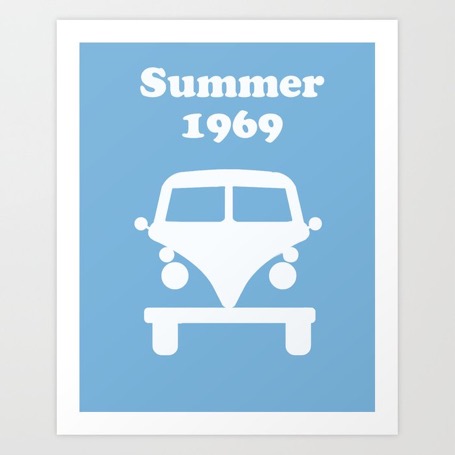TheSummerOf1969

"I guess I would have swallowed most anything then, and likely did."
If you weren't there, you're unlikely to believe a word I say describing that time. TheSummerOf1969 seems in the future now, an idyllic upcoming state those of us who were there briefly glimpsed as we sped by. No, I'm not suggesting that everything was rosy then. I lived under the clear and always-present threat that I would be drafted to fight in a meaningless war half way around the globe. My hometown remained securely in the clutches of an entrenched plutocracy. But I'd somehow survived the gulag that was my high school and I really felt as though I was at least ninety percent upside. I had nothing to regret yet. I had not yet fallen hopelessly in love. I had close friends in high places, and while I didn't share their obsession with getting high, I found their presence nonetheless elevating. We fancied ourselves radical and were frantically growing our hair to prove it. Our future was finally now! ©2019 by David A. Schmaltz - all rights reserved
The world today isn't painted in the same alluring hues. Almost everything I'd do that summer was a fresh and unique experience. I slept in a tent made of surplus Navy signal flags. I hitchhiked from Portland to San Diego with a friend's girl friend and her two year old daughter. I busked along the Oceanside pier to appreciative soldiers waiting to ship out to Vietnam. I owned exactly one pair of shoes, Redwing waffle-soled boots I'd bought as a graduation present for myself. I wore a pocket watch affixed to a belt loop with a cleverly knotted leather thong. I carried my guitar everywhere I went. I had no idea what I was doing.
Experience tends to blunt experience. The first time might prove unforgettable. Later times inevitably emerge as partial revisits with prior experience insisting upon making comparisons and suggesting half-recalled strategies. That first time through proves immortal, after that, regular mortality settles in. I knew how to do almost nothing so I had to invent ways to survive. I observed closely, wondering who I was destined to become. I believed in the innate kindness of strangers and was not disappointed. I believed in our collective ability to create real, lasting change, and found evidence of success everywhere I turned.
My hometown's Main Street had not yet turned into a boulevard of sad consignment shops. My birth family remained intact. Even my grandfathers were still alive. My older siblings were having babies and I found myself elevated to the august role of uncle, an identity I still warmly identify with. I had little identity myself then, a situation I found more comforting than distressing. I wrote and performed my songs to the almost exclusive delight of my closest acquaintances. I had not become a reader yet. I understood where lines were drawn and rarely crossed any of the very important ones. I lived for a time in a neighborhood ringed with burned out cars, leftovers from riots that I thought had little to do with me, though the African American neighbors always eyed me suspiciously.
Naivety inhabits the future, like it inhabited my now fifty year ago past. Everything seemed so brand new simply because it was for me. It was filled with the same reliable old crap every age has carried on her back, but my attention drifted hardly further than the contents of my own backpack, which carried everything I considered my own. Home was where ever I could unroll my sleeping bag. Supper might have been horse meat and I would still swallow it. I guess I would have swallowed most anything then, and likely did.


